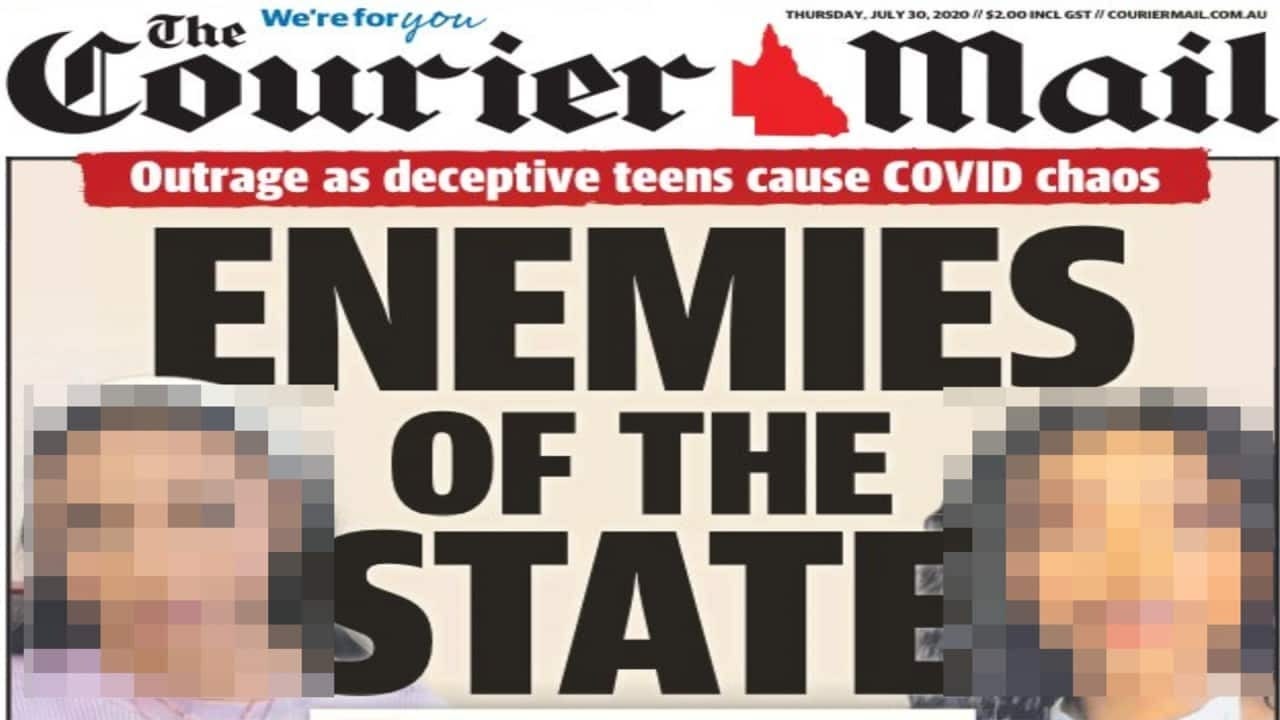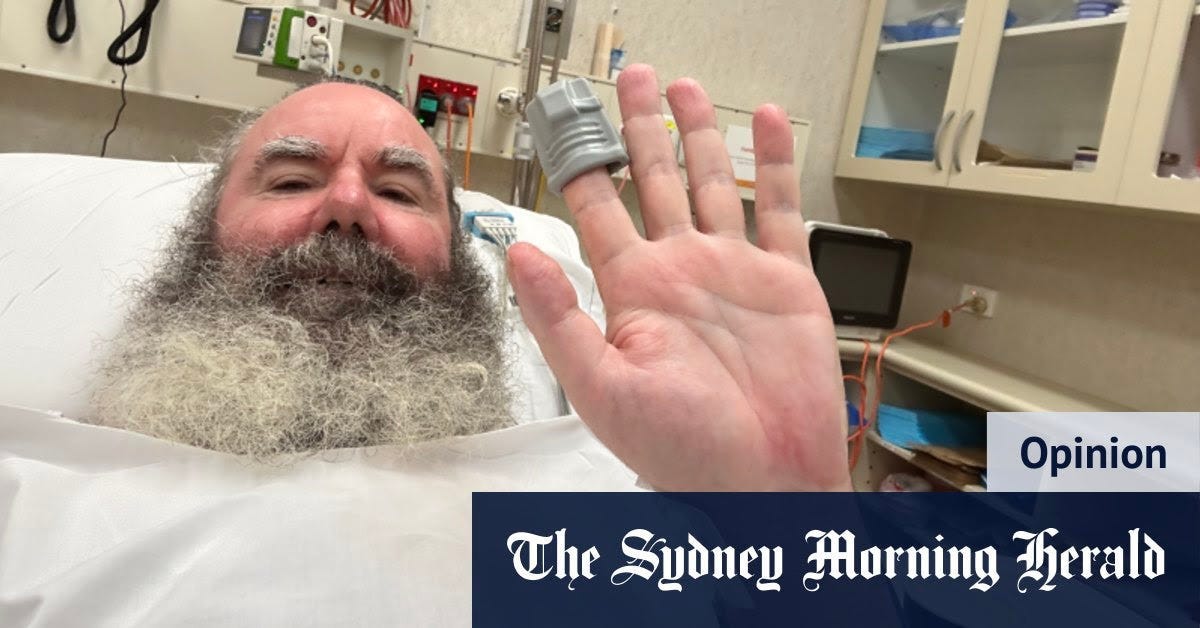Why the media failed during Covid
Insider perspective from a mainstream journalist
Guest post by David Southwell, journalist at Daily Mail Australia
When the Albanese government's expert panel on Australia's Covid response delivered its report late last year the verdict was damning.
The panel found that harsh Covid measures were imposed often without any actual basis of evidence, which caused deep and widespread harm as well as loss of confidence in government.
The media, which I am a very small but picturesque part of, gleefully jumped on this finding.
The Australian Financial Review’s headline was fairly typical: “Heavy-handed COVID restrictions have destroyed trust in government.”
Noticeably missing, however, was any self-awareness of the media’s collective failure to hold maniacal governments to account during the Covid period, a failure which was near total and is largely ongoing.
At the start of the pandemic, I was not working in the media but in comms. From the vantage point of a news consumer I saw a deep, depressing and even bewildering abdication of the Fourth Estate’s supposed role to question and challenge those in power.
Instead of questioning draconian lockdowns at press conferences, I heard journalists cheering them and asking why they weren’t longer and harsher.
An example of the howling hysteria media outlets descended to was when two teen girls facing petty criminal charges broke lockdown travel restrictions prompting News Ltd tabloids to print photos of the pair on their front pages with the headline “Enemies of the state.”

When The Age ran an article about a hospital intensive care unit overflowing with the unvaccinated, who the journo breathlessly told us were victims of the “scourge of disinformation,” I grew increasingly uncomfortable.
“Others come to the realisation too late that the deadly virus is real, begging for a vaccine before being hooked up to a ventilator,” the author Melissa Cunningham wrote, in a sentence that I was startled to realise could be nominated for the propagandist’s hall of fame.
When then federal Health Minister Greg Hunt and former Victorian Chief Medical Officer Brett Sutton praised the story as “powerful” and “important” on Twitter, I knew there was something seriously wrong, because the media’s job is not to push the government’s message.
At least that shouldn't be its job - governments have very big budgets to do their own propaganda, which is why just about every second ad you see on commercial media and online is publicly funded.
If journalism has a public policy role beyond mere description or stenography, it should be to relentlessly question what governments, authorities and, yes, even “experts” are saying and doing.
The bias of journalism should not be towards the right or left, but towards scepticism, and towards seeking out the voices and views that may be getting drowned out.
To quote the old axiom journalism’s role is to “speak truth to power.”
However, during Covid, the media often decided to “speak power to truth.”
When I joined the Daily Mail as a reporter around May 2022, the publication, to its credit, was pushing back against some of the more insane pandemic measures, particularly the nightmarishly interminable lockdowns in Victoria and the ridiculous border closures of WA.
However, it previously had been an enthusiastic barracker for many over-the-top government actions.
Also, the efficacy and safety of the Covid vaccines remained pretty well quarantined from any questioning.
As a lowly reporter, I am largely insulated from the decision-making.
However, I asked around to find out why the Mail, as with most Australian media, fell into line during the pandemic.
Here are five factors as described to me by insiders, and also at times observed by me:
There was overt government pressure. I have been told that Mr Hunt or other federal and state health officials rang editors directly to harangue them directly that they were “putting lives in danger’. In what was being billed as once in a century emergency this pressure could be hard to resist. The other reason traditional outlets want to keep governments onside is they need a champion against social media destroying their business model by giving away their content for free. Australian governments have obliged in this regard by making the likes of Facebook pay traditional outlets for their content.
Social media platforms punished any deviation from the official Covid narrative. Digital news sites rely on social media exposure for most of their traffic, so any drop-off threatens their bottom line. Outlets that did not promulgate the approved narrative risked getting a strike or being downgraded by algorithms to keep their stories submerged online. Mark Zuckerberg recently told Joe Rogan that the Biden administration put pressure on Facebook to remove even factual posts that conflicted with the message authorities were selling. That also happened in Australia. It remains unclear to what extent the social media giants censored by their own volition and how much was “self-censorship” to keep governments happy.
Media outlet owners gave directions to their publications. The Daily Mail is the Australian online version of a mass-circulation British tabloid owned by a family of press lords in the UK. I do not know whether orders came out of London about how Covid was to be covered but head office must at least approve of what the Aussie offshoot is doing.
The mood of the readership as expressed in clicks, social media shares and comments will ultimately prevail in any commercially driven news. Commercial outlets cannot stay out of step with their readers for long. During the Covid period, I was told the Mail audience was readily enthusiastic about imposing and enforcing restrictions and mandates. I find this depressing.
Editors believed what authorities told us. As I have been a dissenter on nearly all Covid matters, I have experienced the sincerity of that belief expressed to me quite bluntly. I have pitched stories that were rejected as “anti-vaxxer’. I have had major arguments about the way my stories have been edited and sometimes accepted edits I did not like to get a story published.
The media’s conformity also likely acts as a reinforcing feedback loop.
Journalists move as a pack, rather like seagulls squalling over chips. Former Queensland Joh Bjelke Peterson made this observation when he labeled his press conferences as “feeding the chooks.”
All outlets obsessively keep a close eye on their competitors to make sure they haven't missed important or high-rating stories and to check the details and developments they have against each other.
Added to this professional incentive to watch your competitors is the fact that the Australian media industry is a small ecosystem,where peer pressure can be pronounced.
Being in the information business, media professionals are particularly sensitive about the risk of being saddled with weaponised terms such as ‘conspiracy theorist’ ‘anti-vaxxer’ and ‘cooker.’
We can see the visceral fear that terms like this inspire for a veteran journalist in a recently published article, where despite trying to deny it half the time, veteran journalist Brendan Foster is forced to conclude the Covid vaccines could be killing him and others of his acquaintance.

The headline encapsulates his ultra-defensiveness: “I kept getting sicker. But you won’t catch me reaching for a tin foil hat.”
Even as he grudgingly compiles strong evidence the vaccine is taking his health and potentially his life, the author seems mostly worried that we might think he is expressing “some crazed, anti-vax conspiracy theory.”
It seems the closer he gets to his death the more he adores his probable executioner as "one of the greatest achievements in medical science." Like George Orwell’s Winston from the dystopian classic 1984, he learns to “love Big Brother.”
I suspect such veneration of “experts” has become more pronounced in journalism as the profession has become more tertiary educated.
In the days of yore, a school leaver could join a media outlet as a copy boy or cadet and basically do an on-the-job apprenticeship to learn journalism, which is the appropriate training for what essentially is a trade rather than academic discipline.
Now a university degree is pretty well mandatory to even get a job interview, and increasingly post-graduate degrees are expected.
People who come out of university (like myself) are indoctrinated at some level to revere “expertise” because that’s the validation of academic knowledge.
However, veneration of authority is fatal to good, or even "real", journalism.
The “real” reporting on Covid has largely come from independent journalists such as the author of this Substack or others equally forensic and fearless including Maryanne Demasi, PhD and Alison Bevege.
While the mainstream media jeered that confidence in government had taken a nosedive after the pandemic, they appeared not to notice that so too did the public's trust in them.
“The media (which included social media) continued to be the most distrusted institution in Australia. Only 38 per cent of survey respondents said they trusted its institutions, a fall of five points,” a survey by global communications firm Edelman found last year.
I’d suggest one way for the traditional media to regain trust is to show more distrust of what is fed to us by governments, authorities and experts even in, or especially during, "emergencies".
In other words, the media should simply do their job.
David Southwell is a reporter for Daily Mail Australia. He has over 20 years' experience in media and communication and has worked on local papers, for wire service AAP and for News Ltd newspapers and websites. His best (self-appointed) job was Morning Tea Correspondent for the Balmain Village Voice.
Follow David on X @SubinthePub
To support my work, share, subscribe, and/or make a one-off contribution to my Kofi account. Thanks!




Here’s what a GP in New Zealand, Alison Goodwin, who was actively challenging the COVID-19 narrative, had to say about the media in July 2021:
QUOTE
If there are journalists and media out there watching, I would like to say that I am disappointed and disillusioned by your profession.
You’re supposed to be asking the tricky questions on behalf of New Zealanders. All you have done is perpetuate a fear-based narrative, and had no place for discussion of alternative views or ideas.
END OF QUOTE
The mainstream media has been an unmitigated disaster. The major story they have ignored and continue to ignore is that there is no valid consent for all the millions of COVID-19 vaccinations administered under coercion and mandates. This is a dynamite story, still waiting to be exposed.
See my article about NZ GP Alison Goodwin, who fought for patients’ rights and informed consent to be defended back in July 2021…but she was ignored…
And now here we are…no valid consent.
See: "This is unethical and this is madness" - NZ doctor Alison Goodwin on the COVID-19 vaccine rollout, 3 July 2021: https://elizabethhart.substack.com/p/this-is-unethical-and-this-is-madness
It’s easy to fail when you’re paid to fail especially when the Govt offers you Tax exemptions for following/ amplifying their preffered narrative throughout COVID & demonising anything that doesn’t fit it.
What the main stream media are slowly starting to realise now is that their business model is totally screwed because no one trusts them anymore, no one reads their articles anymore, no one watches them on TV anymore because they’ve lost all credibility.
Without viewers, readers & people engaged in your content how are you supposed to sell advertising to keep your business model profitable? 🤔